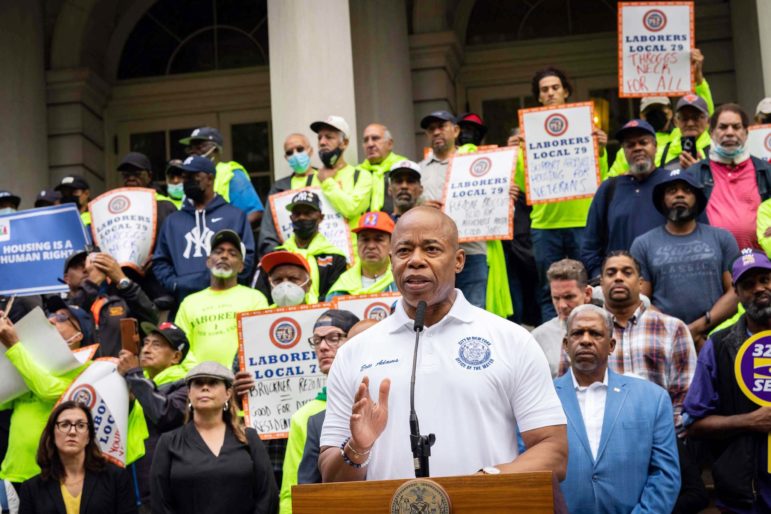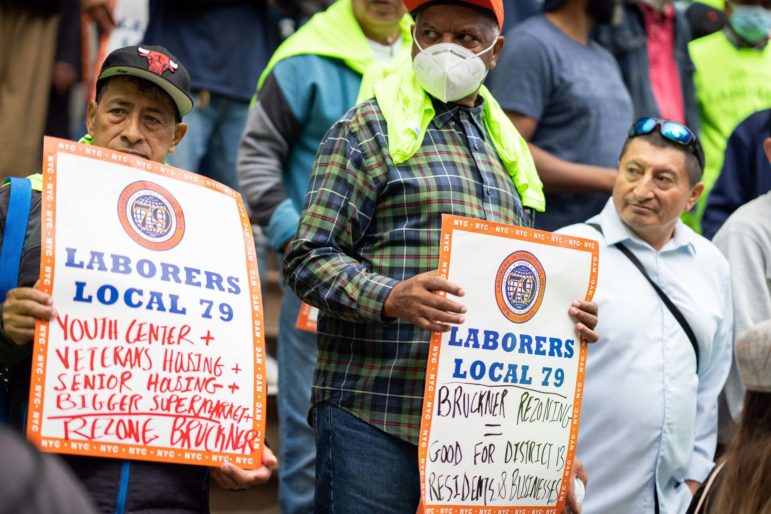The Council’s Land Use Committee voted 10-0 to approve a residential rezoning along a strip of Bruckner Boulevard in Throggs Neck after Councilmember Marjorie Velázquez said she backed the plan, following months of opposition.

Ed Reed/Mayoral Photography Office
Mayor Eric Adams and local labor unions rallied in favor of the Bruckner rezoning last month.
The City Council is poised to approve a plan to add 349 new apartments to a stretch of low-density Throggs Neck after local councilmember Marjorie Velázquez, who for months opposed the project, urged her colleagues to support the developers’ rezoning application Thursday.
The Council’s Land Use Committee later voted 10-0 to approve the residential rezoning, sending it to a binding vote before the full Council later this month.
Velázquez’s about-face came after she consistently criticized the plan to upzone a stretch of Bruckner Boulevard to make way for four new apartment buildings, including two rising eight stories tall, on the edge of a neighborhood zoned for two- and three-story buildings and characterized by single-family homes.
The rezoning will affect four parcels overlooking the Bruckner Expressway, including the site of a Super Foodtown grocery store, and encountered opposition from Bronx Community Board 10 as well as ferocious pushback from vocal neighborhood residents. A group of property owners organized as Throggs Neck Associates LLC submitted the application to allow them to build the apartment buildings on what is now land zoned for commercial or lower-density residential use.
Velázquez said Thursday that round-the-clock negotiations had persuaded her to support the plan in the best interests of her district.
“We need to build a better New York City. That does not mean we hand over our keys to developers,” she said at a subcommittee hearing before the Land Use vote Thursday. “That does not mean that we remove the art of negotiation from the councilmembers.”
“Member deference is not dead,” she added, referring to the Council’s tradition of voting with the local member on land use issues in their district—a practice that has, in the past, spelled the end for some development proposals opposed by their reps.
But in recent days, the impending vote on the Bruckner rezoning threatened to upend that tradition of “member deference,” according to multiple councilmembers, labor groups and city officials. Mayor Eric Adams, Council leadership, unions and pro-development groups had all gone to bat for the project privately and publicly—relatively rare for a private rezoning application—and had urged councilmembers to back the proposal in spite of Velazquez’s opposition.
Supporters, including Adams, cited the dearth of affordable housing created in Council District 13 over the past decade: Just 58 income-restricted units were built in the district during Mayor Bill de Blasio’s time in office, according to Department Housing Preservation and Development data. The proposed Bruckner development will include 168 apartments with rents capped for low- and middle-income tenants, according to the application and presentations made by the developers.
Adams celebrated the land use committee’s vote in a statement Thursday, saying the rezoning will move New York closer to becoming a “City of Yes”—a catchphrase he has repeated as he touts the need for more housing development geared to all income levels.

Ed Reed/Mayoral Photography Office
The mayor and labor leaders rallied on the steps of City Hall in favor of the Throggs Neck rezoning.
“Today’s vote is a victory for the Throggs Neck community, the Bronx, and the entire city,” Adams said. “The housing crisis impacts all of us, and every community has a responsibility to be part of the solution and help us provide safe, quality homes to all New Yorkers.”
Overall, the buildings will include 99 income-restricted apartments under the city’s Mandatory Inclusionary Housing (MIH) rules, 99 units reserved for seniors and 25 for veterans—though the planned provider, Tunnels to Towers Foundation, has pulled out.
Rents in the income-restricted apartments will vary but will be priced for tenants earning an average of 80 percent of Area Median Income (about $96,000 for a family of three), according to the city’s Planning Department. That means many units deemed “affordable” will be priced for households and individuals earning well over $150,000, while others will be reserved for households earning less than $50,000. An apartment is considered affordable when rent and utilities cost no more than 30 percent of a household’s monthly income.
The rezoning debate comes as another land use project proposed in Velázquez’s district, a supportive housing site for formerly incarcerated New Yorkers with severe medical problems, faces now-familiar backlash and has yet to earn the councilmember’s support. A separate rezoning application to build a massive apartment complex atop an Astoria manufacturing district is also approaching a Council vote, with the local member, Julie Won, so far opposing it over a lack of deeply affordable housing.
The fate of the Bruckner plan also remained unclear until hours before the committee voted Thursday, with opposition from the Carpenter’s Union complicating the plan. The union last month slammed the project because they said their members would not receive enough work in the four buildings. By Wednesday, however, they had flipped after earning an agreement to work on the senior housing site. Two other influential labor unions, 32BJ and Local Laborers’ 79, had rallied in support of the rezoning.
Still, residents of surrounding Throggs Neck, many of whom are middle-income homeowners, have sharply criticized the plan to change suburban land use rules in the area, which was downzoned in 2004 under Mayor Michael Bloomberg.
And while some opposition has relied on racist tropes—with residents suggesting crime would rise as low-income people of color move into new “affordable housing”—other opponents said they feared the impact on local infrastructure and parking. They also cast doubt on the competence of the developers.
“Much of the testimony you will hear, particularly from people who don’t live in the community, is that our opposition is race based, nothing could be further from the truth,” said Community Board 10 Chair Joseph Russo in testimony submitted to the Council last month. “The community is not opposed to development or investment. We are not opposed to affordable housing, senior living or veteran’s housing. But develop and invest within the structure of the zoning.”
Russo said the community fought for decades to win the Bloomberg-era downzoning and worried how the property owners, with no track record of residential development or management, would erect and sustain the new housing. The development team, Throggs Neck Associates LLC, includes the owners of the Super Foodtown, parcels of vacant land and low-rise buildings containing a handful of businesses, including batting cages.
“Throggs Neck deserves better, the Bronx deserves better, and New York City deserves better,” Russo said.
In a statement Thursday, Throggs Neck Associates LLC said the plan will address “the urgent need for affordable homes and good union jobs across the five boroughs.”
“We applaud Council Member Velazquez for her leadership in standing up for Throggs Neck and ensuring seniors, veterans and young people will have an opportunity to call this community home,” they added.









2 thoughts on “Bruckner Rezoning Poised to Pass After Councilmember’s Change of Heart”
No, the Bronx just lost one of it’s last middle-class neighborhoods. NYC should not be waging war on middle-class neighborhoods and on middle-class homeowners, and Adams shouldn’t be part of it. Why is he siding with those who want to destroy a neighborhood of homeowners?
I reside at 706 Courtlandt Avenue Bronx NY 10451. The ladies here are facing discrimination and they’re doing illegal activities in this shelter. Please can Get help with this matter. ASAP.